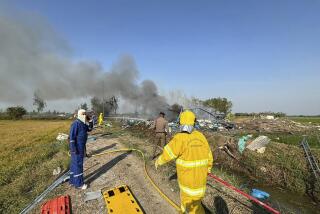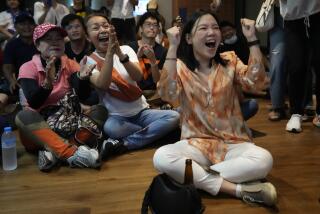Anti-government protests in Thailand turn violent with explosion
- Share via
An explosive device tossed into a crowd of anti-government protesters in Bangkok on Friday injured at least 36 people and ominously altered the mood of a 2-month-old campaign to force out Thai Prime Minister Yingluck Shinawatra.
Government supporters and opponents blamed each other for the early afternoon attack, the first violent outgrowth of the protracted unrest to occur during daylight hours, authorities said.
There have been eight deaths and more than 400 injuries in the unrest that began in late November. But the violence has previously been confined to late-night skirmishes between pro- and anti-government demonstrators.
“Shutdown Bangkok” organizer Suthep Thaugsuban was marching nearby when the explosive device, thought to be a grenade thrown from a nearby building, detonated amid the procession around 1 p.m., news agencies in Bangkok reported.
“The bomb went off about 30 meters [100 feet] from Suthep, and then his bodyguards escorted him back to a rally stage,” opposition spokesman Akanat Promphan told Agence France-Presse.
Political turmoil has wracked Thailand off and on for eight years, since the urban elite and upper-middle-class Thais moved against Yingluck’s brother, then-Prime Minister Thaksin Shinawatra. He was deposed in 2006 and has spent much of the time since in exile in Dubai.
Thaksin has been convicted of corruption, the motivation behind his self-imposed exile. On Thursday, the country’s anti-corruption commission said it had opened an investigation into alleged misuse of office by Yingluck as well.
Many members of the country’s elites and business circles are backing the current drive to oust Yingluck, whom they accuse of acting as her brother’s proxy and courting favor with the rural poor with corrupt, populist schemes like lavish rice subsidies.
Political analysts suspect the opposition protests are aimed at creating enough public disturbance and business disruption to compel the army, which is led by generals beholden to the elites, to seize power and restore order. The army has carried out or attempted at least 18 coups since the country reduced the authorities of an absolute monarchy in 1932.
Thai media quoted opposition leader Suthep as accusing the government of being behind Friday’s attack and vowing at a later rally to continue the protest movement despite being the target of “paid assassins.”
A spokesman for Yingluck’s Puea Thai Party accused the opposition of carrying out the explosion to invigorate demonstrations that have gradually been losing steam.
“The movement is desperate,” said Anusorn Iamsa-ard. “Its attempt to shut down this city have not been successful, so it is trying different tactics, including staging attacks and blaming them on the government.”
The movement aimed at forcing Yingluck’s resignation and the handover of governing authority to an appointed “people’s council” began in November as a massive protest against her government’s ill-considered amnesty bill, which would have allowed Thaksin to return from exile without the threat of the two-year jail term he was handed on the corruption charges.
The campaign is now aimed at derailing the Feb. 2 election Yingluck has called and that her party, which has won every major vote for the past dozen years, is expected to win handily.
Yingluck offered negotiations on the election date earlier this week, but Suthep boycotted the meeting.
Twitter: @cjwilliamslat
More to Read
Sign up for Essential California
The most important California stories and recommendations in your inbox every morning.
You may occasionally receive promotional content from the Los Angeles Times.











